Back To The PPL Wetlands, An Early Start Was Rewarded With Wood Ducks And Kingfishers
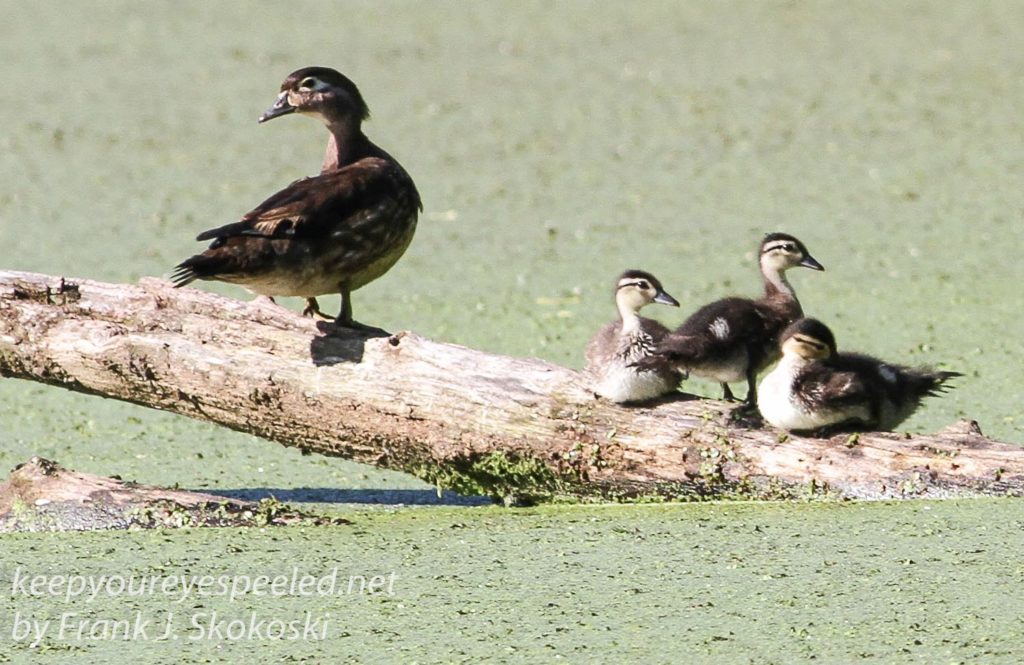
It has always been hard for me to get enough sleep in the Summer. The birds start singing about a half hour before the sunrise, which occurs around 5:30 a.m. near the solstice here in Northeastern Pennsylvania. And evening twilight lingers for about an hour after sunset which occurs around 8:40 p.m. I don’t like to miss either. But I was up late Saturday night so I missed the Sunday sunrise. It was a beautiful sunny morning and I decided to skip my usual early morning walk through my neighborhood and head down back to the PPL Wetlands.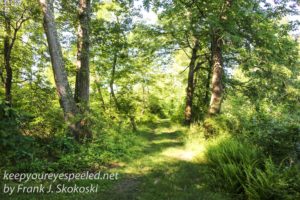
I arrived around 8 a.m., still too late to watch the wetlands awake, but early enough to to see some of the early morning activity of many of the birds and animals before the heat of the day set in. 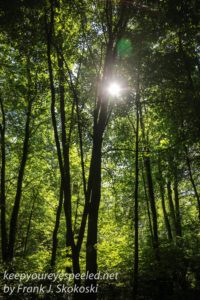
I love the early morning sunshine and how it filters through the trees and lights up the leaves. It is a magical time of the day.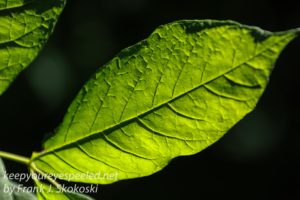
And I was soon rewarded for my early arrival when I found this usually shy and elusive mother wood duck sitting on a log with her ducklings. 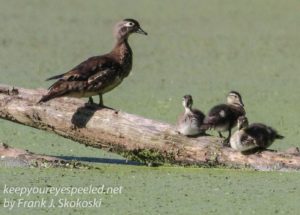
I also encountered many birds looking for, and some finding, a breakfast meal, such as this song sparrow and it’s dragonfly snack.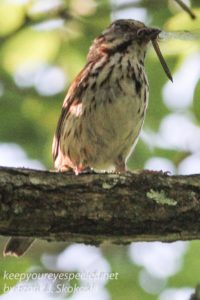
As I walked under the trees in filtered morning sunlight I spooked a deer, some rabbits, chipmunks and this curious red squirrel. 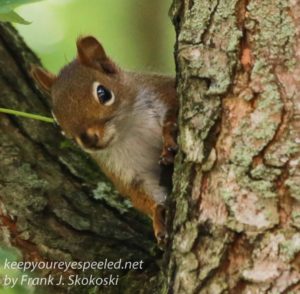
I again walked past plenty of clusters of green blue berries and also came across many green blackberries 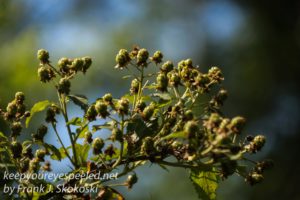
as well as clusters of immature wild grapes. There will be plenty of food for the wildlife of the wetlands in the coming months. 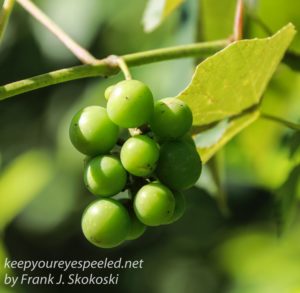
The duckweed covered water of the wetlands were also the gathering place of many turtles, 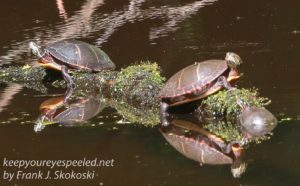
and a few frogs that I was able to see. I heard the croaking of many more in the now warm ponds and canals.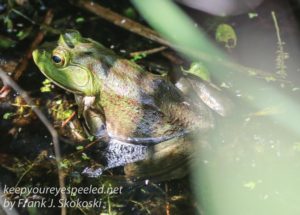
I walked to Lake-Took-A- While where I was delighted to see, sitting on a power line, these two kingfishers. I remember first reading about this remarkable bird in an SRA reading program in third grade and always wanted to watch them catch fish as I had read in the story so many years ago. 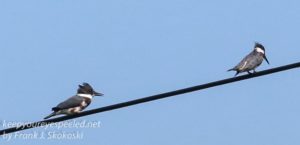
I didn’t see them catch any fish but enjoyed observing them and soon saw a third bird appear and knew it was the same family I saw the day before. A little later in the day one of these birds and I had an even closer encounter as it swooped over my head as I was photographing dragonflies. 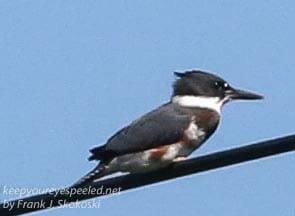
And once again, as the sun warmed the cool morning air, there were plenty of dragonflies. I had already encountered swarms of mosquitoes earlier when I first arrived. 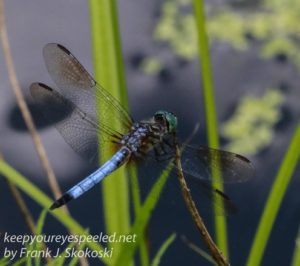
And the numerous insects provided plenty of opportunity for the birds, , including this one, I believe a great crested flycatcher , to find a meal.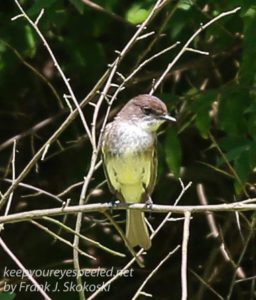
And there was plenty of other food for all of the birds, including this pair of cedar waxwings who enjoyed the fruit of this mulberry trees.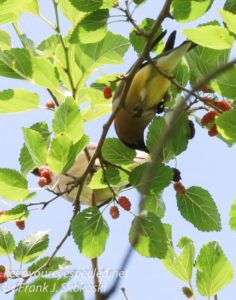
The warm waters also had plenty of fish swimming close to the surface, including these large one which I can’t identify. 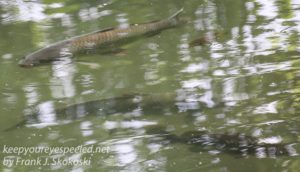
The abundance of fish always provided plenty of food for the kingfishers blue herons and this green heron. 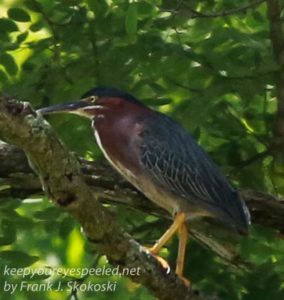
I could spend the entire day exploring these woodlands but I was getting tired and hungry so decided to head home. On my return walk I again encountered many robins, catbirds and the red winged blackbirds that frequent the wetlands,
and always near by is a female. 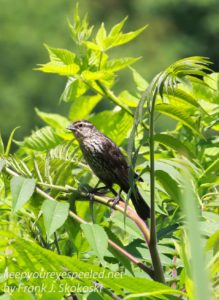
I was hearing the pleasant song of the yellow warblers in the treetops and I finally was able to see, and photograph one as I neared my car. Here is a link to some more of the birds I saw on my walk. https://keepyoureyespeeled.net/photographs-2017/nggallery/photographs-2017/PPL-Wetlands-birds-June-25-2017
It was another great day to be outdoors in Northeastern Pennsylvania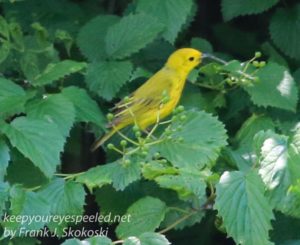 . Here is a link to some more photographs from my hike. https://keepyoureyespeeled.net/photographs-2017/nggallery/photographs-2017/PPL-Wetlands-June-25-2017-
. Here is a link to some more photographs from my hike. https://keepyoureyespeeled.net/photographs-2017/nggallery/photographs-2017/PPL-Wetlands-June-25-2017-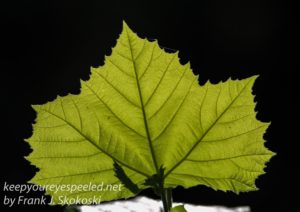
“For most of history, man has had to fight nature to survive; in this century he is beginning to realize that, in order to survive, he must protect it.”
― Jacques-Yves Cousteau
Tags
Categories
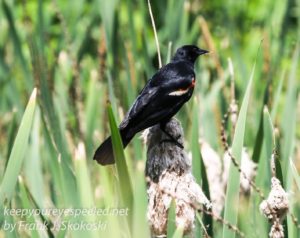
Recent Comments